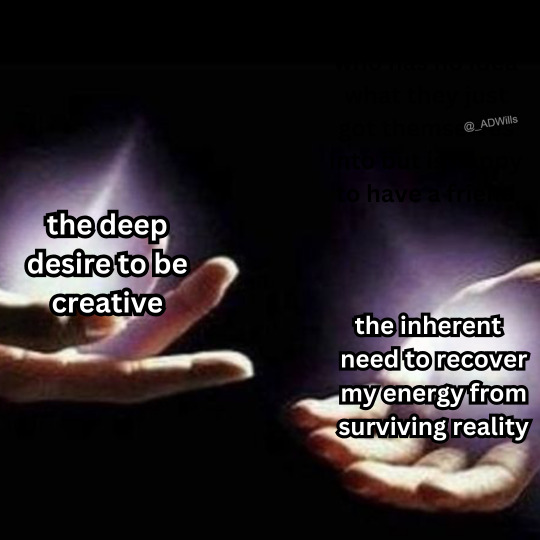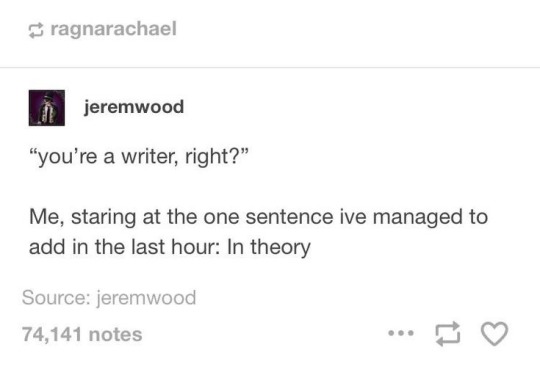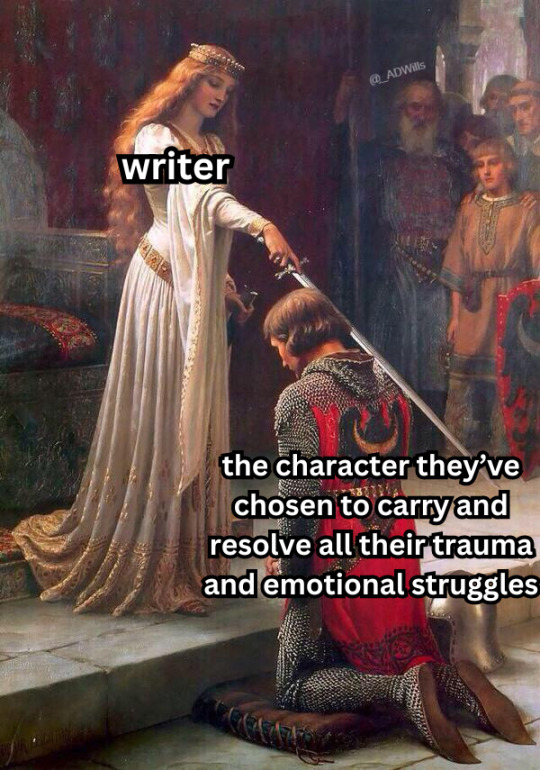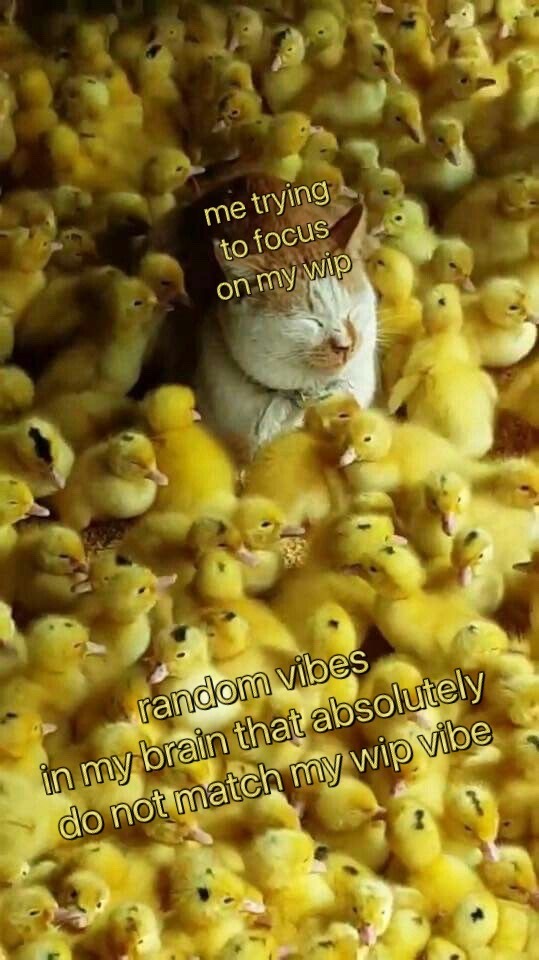Text
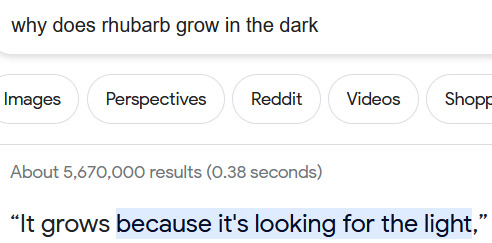
this is the saddest fucking thing. wheres that post about when you cant even write a poem about it because its just there already
45K notes
·
View notes
Text
site that you can type in the definition of a word and get the word
site for when you can only remember part of a word/its definition
site that gives you words that rhyme with a word
site that gives you synonyms and antonyms
1M notes
·
View notes
Text
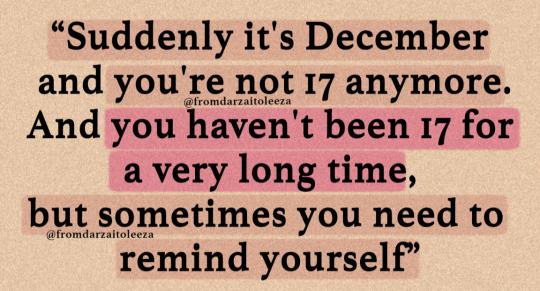

{Quotes marguaxpoetry on Instagram / Sarah Kay}
27K notes
·
View notes
Text
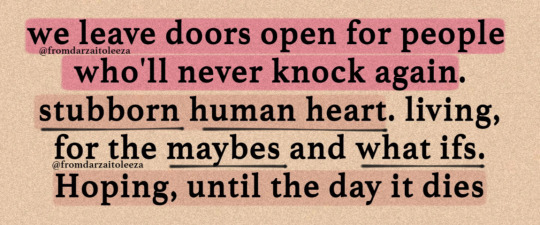

—Albert Camus, The Myth of Sisyphus and Other Essays
6K notes
·
View notes
Text
What not to care about while writing
Writing can be difficult.Here are some basic things i learned to NOT give a fuck about while writing your first draft!
Grammar and spelling in your first draft.
What others might think of your story.
The length of your story; it can be short or long.
Writing every detail - leave room for the reader's imagination.
Whether your story aligns with current trends or popular genres.
Overthinking the title or cover art at the beginning.
Perfect pacing in the initial draft.
The order in which you write scenes - you can rearrange later.
Trying to make every character likable or relatable.
Writing the perfect first draft; let your first draft be really messy.#

2K notes
·
View notes
Text
Things That May Be Causing Your Writer's Block- and How to Beat Them
I don't like the term 'Writer's Block' - not because it isn't real, but because the term is so vague that it's useless. Hundreds of issues all get lumped together under this one umbrella, making writer's block seem like this all-powerful boogeyman that's impossible to beat. Worse yet, it leaves people giving and receiving advice that is completely ineffective because people often don't realize they're talking about entirely different issues.
In my experience, the key to beating writer's block is figuring out what the block even is, so I put together a list of Actual Reasons why you may be struggling to write:
(note that any case of writer's block is usually a mix of two or more)
Perfectionism (most common)
What it looks like:
You write one sentence and spend the next hour googling "synonyms for ___"
Write. Erase. Write. Rewrite. Erase.
Should I even start writing this scene when I haven't figured out this one specific detail yet?
I hate everything I write
Cringing while writing
My first draft must be perfect, or else I'm a terrible writer
Things that can help:
Give yourself permission to suck
Keep in mind that nothing you write is going to be perfect, especially your first draft
Think of writing your first/early drafts not as writing, but sketching out a loose foundation to build upon later
People write multiple drafts for a reason: write now, edit later
Stop googling synonyms and save that for editing
Write with a pen to reduce temptation to erase
Embrace leaving blank spaces in your writing when you can't think of the right word, name, or detail
It's okay if your writing sucks. We all suck at some point. Embrace the growth mindset, and focus on getting words on a page
Lack of inspiration (easiest to fix)
What it looks like:
Head empty, no ideas
What do I even write about???
I don't have a plot, I just have an image
Want to write but no story to write
Things that can help:
Google writing prompts
If writing prompts aren't your thing, instead try thinking about what kind of tropes/genres/story elements you would like to try out
Instead of thinking about the story you would like to write, think about the story you would like to read, and write that
It's okay if you don't have a fully fleshed out story idea. Even if it's just an image or a line of dialogue, it's okay to write that. A story may or may not come out of it, but at least you got the creative juices flowing
Stop writing. Step away from your desk and let yourself naturally get inspired. Go for a walk, read a book, travel, play video games, research history, etc. Don't force ideas, but do open up your mind to them
If you're like me, world-building may come more naturally than plotting. Design the world first and let the story come later
Boredom/Understimulation (lost the flow)
What it looks like:
I know I should be writing but uugggghhhh I just can'tttttt
Writing words feels like pulling teeth
I started writing, but then I got bored/distracted
I enjoy the idea of writing, but the actual process makes me want to throw my laptop out the window
Things that can help:
Introduce stimulation: snacks, beverages, gum, music such as lo-fi, blankets, decorate your writing space, get a clickity-clackity keyboard, etc.
Add variety: write in a new location, try a new idea/different story for a day or so, switch up how you write (pen and paper vs. computer) or try voice recording or text-to-speech
Gamify writing: create an arbitrary challenge, such as trying to see how many words you can write in a set time and try to beat your high score
Find a writing buddy or join a writer's group
Give yourself a reward for every writing milestone, even if it's just writing a paragraph
Ask yourself whether this project you're working on is something you really want to be doing, and be honest with your answer
Intimidation/Procrastination (often related to perfectionism, but not always)
What it looks like:
I was feeling really motivated to write, but then I opened my laptop
I don't even know where to start
I love writing, but I can never seem to get started
I'll write tomorrow. I mean next week. Next month? Next month, I swear (doesn't write next month)
Can't find the time or energy
Unreasonable expectations (I should be able to write 10,000 words a day, right????)
Feeling discouraged and wondering why I'm even trying
Things that can help:
Follow the 2 min rule (or the 1 paragraph rule, which works better for me): whenever you sit down to write, tell yourself that you are only going to write for 2 minutes. If you feel like continuing once the 2 mins are up, go for it! Otherwise, stop. Force yourself to start but DO NOT force yourself to continue unless you feel like it. The more often you do this, the easier it will be to get started
Make getting started as easy as possible (i.e. minimize barriers: if getting up to get a notebook is stopping you from getting started, then write in the notes app of your phone)
Commit to a routine that will work for you. Baby steps are important here. Go with something that feels reasonable: every day, every other day, once a week, twice a week, and use cues to help you remember to start. If you chose a set time to write, just make sure that it's a time that feels natural to you- i.e. don't force yourself to writing at 9am every morning if you're not a morning person
Find a friend or a writing buddy you can trust and talk it out or share a piece of work you're proud of. Sometimes we just get a bit bogged down by criticism- either internal or external- and need a few words of encouragement
The Problem's Not You, It's Your Story (or Outline (or Process))
What it looks like:
I have no problems writing other scenes, it's just this scene
I started writing, but now I have no idea where I'm going
I don't think I'm doing this right
What's an outline?
Drowning in documents
This. Doesn't. Make. Sense. How do I get from this plot point to this one?!?!?! (this ColeyDoesThings quote lives in my head rent free cause BOY have I been there)
Things That Can Help:
Go back to the drawing board. Really try to get at the root of why a scene or story isn't working
A part of growing as a writer is learning when to kill your darlings. Sometimes you're trying to force an idea or scene that just doesn't work and you need to let it go
If you don't have an outline, write one
If you have an outline and it isn't working, rewrite it, or look up different ways to structure it
You may be trying to write as a pantser when you're really a plotter or vice versa. Experiment with different writing processes and see what feels most natural
Study story structures, starting with the three act structure. Even if you don't use them, you should know them
Check out Ellen Brock on YouTube. She's a professional novel editor who has a lot of advice on writing strategies for different types of writers
Also check out Savage Books on YouTube (another professional story editor) for advice on story structure and dialogue. Seriously, I cannot recommend this guy enough
Executive Dysfunction, Usually From ADHD/Autism
What it looks like:
Everything in boredom/understimulation
Everything in intimidation/procrastination
You have been diagnosed with and/or have symptoms of ADHD/Autism
Things that can help:
If you haven't already, seek a diagnosis or professional treatment
Hire an ADHD coach or other specialist that can help you work with your brain (I use Shimmer; feel free to DM me for a referral)
Seek out neurodiverse and neurodiverse writing communities for advice and support
Try body doubling! There's lot's of free online body doubling websites out there for you to try. If social anxiety is a barrier, start out with writing streams such as katecavanaughwrites on Twitch
Be aware of any sensory barriers that may be getting in the way of you writing (such as an uncomfortable desk chair, harsh lighting, bad sounds)
And Lastly, Burnout, Depression, or Other Mental Illness
What it looks like:
You have symptoms of burnout or depression
Struggling with all things, not just writing
It's more than a lack of motivation- the spark is just dead
Things that can help:
Forget writing for now. Focus on healing first.
Seek professional help
If you feel like it, use writing as a way to explore your feelings. It can take the form of journaling, poetry, an abstract reflection of your thoughts, narrative essays, or exploring what you're feeling through your fictional characters. The last two helped me rediscover my love of writing after I thought years of depression had killed it for good. Just don't force yourself to do so, and stop if it takes you to a darker place instead of feeling cathartic
17K notes
·
View notes
Text
Everything You Need To Know About Writing Gunshot Wounds
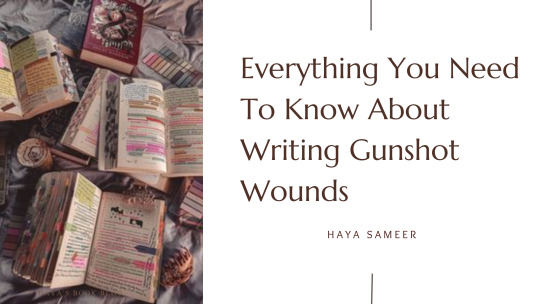
Welcome to the latest installment in my ongoing series on crafting realistic wounds in fiction! After covering stab wounds and burns, it's time to explore the next wound category frequently explored in fiction—gunshot wounds.
Gunshot wounds are a recurring motif in the realm of storytelling. They're something you can easily come across in every genre, however, authors often poorly portray gunshot wounds due to lack of proper research. I understand finding the right resources to aid with your writing can be hard, so here's my comprehensive guide on how to write gunshot wounds.
How To Categorise Gunshot Wounds
There are certain factors you need to consider before writing a gunshot wound. These details are instrumental in crafting a vivid and plausible narrative while avoiding plot holes. The first and most important one is identifying the type of firearm used to inflict the wound.
Picking The Right Firearm
Selecting the appropriate firearm to inflict a gunshot wound is a pivotal decision. It's not just about choosing any gun; it's about picking the right one to align with your desired outcome and the narrative's overall impact. Here's a quick guide on how to pick the right firearm.
The Impact of Firearm Selection
The firearm you choose can significantly influence the severity and appearance of the gunshot wound. Whether your goal is a graphic, gory injury or a precise, long-range shot, the choice of firearm plays a crucial role. Here are some guns you to consider:
Handguns: These are versatile and commonly used in close-quarters combat. They can result in gruesome, close-contact wounds with a higher potential for damage due to their stopping power.
Shotguns: Shotguns disperse shot pellets upon firing, making them suitable for creating a broader pattern of injuries. If you aim to depict a devastating, close-range gunshot wound, shotguns can be a fitting choice.
Rifles: Rifles are known for their accuracy at longer distances. When you need a precise, long-range shot, rifles are the go-to option. They tend to produce a cleaner wound channel, especially when used for a targeted, well-planned injury.
Choosing the Right Firearm for Your Narrative
The type of firearm you select should align with your story's objectives. If you intend to evoke visceral, gory reactions, opt for handguns or shotguns used in close proximity. On the other hand, if precision and long-range engagement are key, rifles can achieve your desired outcome.
Keep in mind that firearm selection can affect the wound's damage, trajectory, and overall portrayal in your narrative.
Categorising The Wound
Once you've identified the type of firearm, you need to establish what type of wound your character will incur.
In order to bring your character's injuries to life, it's important to first identify what you're dealing with. You can do this by categorising the injury based on several factors. For gunshot wounds, this includes the type of firearm used, the bullet's trajectory, and the specific areas of the body affected.
You can categorise your character's gunshot would into seven main categories, here's a quick breakdown of what these categories look like and the level of severity associated with them:
Penetrating Gunshot Wounds: These wounds occur when a bullet enters the body but doesn't exit. The bullet remains inside the body, causing damage along its path.
Perforating Gunshot Wounds: In this case, the bullet enters the body and exits on the opposite side. This type of wound can have a different set of implications due to the bullet's trajectory.
Ricochet Gunshot Wounds: Ricochet wounds happen when the bullet bounces off a surface before hitting the character. The nature of the surface can influence the severity of the wound.
Through-and-Through Gunshot Wounds: As the name suggests, these wounds occur when the bullet enters one side of the body and exits through the other. The trajectory can greatly affect the injury's severity.
Close-Contact Gunshot Wounds: These wounds result from the firearm being fired at extremely close range. The proximity of the gun to the body can lead to unique wound patterns and burn injuries.
Shotgun Wounds: Shotgun wounds differ from those caused by handguns or rifles. The shot pellets disperse upon firing, leading to a broader pattern of injury.
Long-Range Gunshot Wounds: When a character is shot from a considerable distance, the wound might appear different due to factors like bullet tumbling and loss of velocity.
The Anatomy of a Gunshot Wound
To create a vivid portrayal of a gunshot wound, writers need to grasp not only the external appearance but also the internal effects it has on the body. A well-executed description captures both the physical trauma and the emotional turmoil experienced by the character. Here are some symptoms you should take into consideration.
1. External Appearance and Bleeding:
Wound Size: The size of a gunshot wound can vary significantly based on the type of firearm and bullet used. Smaller calibers may leave entry and exit wounds that are relatively small, while larger bullets or high-velocity rounds can create much larger wounds. Be specific about the size, which can help readers visualize the injury.
Blood Loss: Gunshot wounds typically result in bleeding. The severity of bleeding depends on factors like the wound's location, the size of the blood vessels damaged, and the bullet's trajectory. Mention the amount of blood, but avoid excessive gore unless it serves a specific purpose in your narrative.
Coughing Up Blood: If the gunshot wound affects the chest or lung area, characters may cough up blood. This symptom often signifies a more critical injury and can add drama to your story.
2. Internal Damage and Symptoms:
Pain: Gunshot wounds are painful, and the character should express this pain through their actions, dialogue, and internal thoughts. Describe the sharp, burning, or throbbing sensations as they resonate through the character's body.
Shock: Depending on the severity of the wound, shock can set in. The character may appear pale, sweaty, and disoriented. This state of shock can impact their actions and decisions.
Loss of Function: A gunshot wound may impair the use of the injured body part. Describe any loss of function, such as the inability to move a limb or use it effectively.
Fainting: In extreme cases, characters may faint due to the pain, blood loss, or shock. Be sure to contextualize this within the narrative, as fainting can have significant consequences for the character.
By diving into the details of a gunshot wound's anatomy, you can craft a compelling and realistic portrayal that draws readers into the character's harrowing experience. I haven't exactly covered every symptom out there, but these are the major ones you should take into account when writing.
Medical Assessment and Treatment
Once you've established your gunshot wound, it's now time to focus on the aftermath. One of the main factors to consider is the medical process that follows. If your character is supposed to die from the gunshot then you could probably skip this section, but if they're alive here are things you need to consider.
1. Initial Assessment:
Scene Safety: In a real-life scenario, safety is paramount. First responders will ensure the scene is secure before approaching the injured person. Consider factors like the presence of firearms, potential threats, and the safety of medical personnel.
ABCs of Assessment: Medical professionals follow the ABCs—Airway, Breathing, and Circulation. Writers can reflect this in their storytelling by highlighting the character's ability to breathe, cough, or speak after being shot.
Vital Signs: Mentioning vital signs like heart rate, blood pressure, and oxygen saturation can help convey the character's condition and the urgency of their medical treatment.
2. Trauma Assessment:
Focused Assessment: Medical personnel perform a thorough examination to identify the gunshot wound's location, entry and exit points, and any associated injuries. This assessment informs their treatment plan.
Imaging: Depending on the complexity of the injury, X-rays or other imaging may be required to visualize the bullet's trajectory and any potential damage to internal organs or bones.
3. Treatment:
Bleeding Control: Stopping the bleeding is a top priority. This may involve applying pressure, packing the wound, or even tourniquet application in extreme cases.
Wound Care: Depending on the wound's severity, cleaning and suturing may be required. The character's response to this procedure can add an element of realism to your narrative.
Pain Management: Gunshot wounds are excruciatingly painful, and medical personnel will often administer pain relief or anesthesia during treatment.
Monitoring and Observation: Patients with gunshot wounds require careful observation and monitoring for signs of infection, complications, or changes in their condition.
By accurately portraying the medical assessment and treatment of gunshot wounds, you not only enhance the authenticity of your writing but also depict the physical and emotional toll such injuries can take on your characters. This attention to detail helps your readers connect more deeply with the story.
The Psychological Impact
Gunshot wounds don't just inflict physical harm; they also leave lasting emotional and psychological scars. It is important to note that the extent of the psychological impact on your characters will heavily rely on various factors.
For example, you need to consider whether or not this injury is something normal for them. Do they work as a spy, assassin, or other such roles that would mandate such dangerous injuries? You also need to consider who shot them. Does this wound come with emotional damage as well? Think of Aaron Warner’s reaction to Juliet shooting him.
If you’re sure your character will have some extent of a psychological impact, here are some factors you should consider.
1. Shock and Denial:
Immediate Response: Characters who have been shot may initially experience shock and denial. This can manifest as disbelief, emotional numbness, or a surreal sense of detachment from the situation.
Physical Symptoms: Shock can lead to physical symptoms like trembling, chills, or even fainting. Incorporating these details can make the character's reaction more genuine.
2. Fear and Anxiety:
Survivor's Guilt: Characters may grapple with survivor's guilt if they are the only ones to emerge unscathed in a violent encounter.
Anxiety: The threat of recurrence or the fear of returning to the location where the shooting occurred can trigger anxiety and panic attacks.
3. Post-Traumatic Stress Disorder (PTSD):
Flashbacks and Nightmares: Characters who have survived a gunshot wound may experience recurring flashbacks and nightmares, vividly reliving the traumatic event.
Hypervigilance: PTSD can lead to hypervigilance, where characters are constantly on edge, expecting danger at every turn.
4. Depression and Isolation:
Emotional Withdrawal: Characters may withdraw from social interactions, experiencing feelings of isolation and sadness.
Emotional Numbness: Some may describe feeling emotionally numb, unable to experience joy or pleasure.
5. Recovery and Resilience:
Therapeutic Support: In your storytelling, consider how characters seek therapy or counseling to cope with their emotional scars. Therapy can be a path toward recovery and resilience.
By addressing the psychological impact of gunshot wounds on your characters, you create more layered and relatable individuals within your narrative. This depth allows readers to connect with the characters on a profound emotional level.
I hope this blog on Everything You Need To Know About Writing Gunshot Wounds will help you in your writing journey. Be sure to comment any tips of your own to help your fellow authors prosper, and follow my blog for new blog updates every Monday and Thursday.
Looking For More Writing Tips And Tricks?
Are you an author looking for writing tips and tricks to better your manuscript? Or do you want to learn about how to get a literary agent, get published and properly market your book? Consider checking out the rest of Haya’s book blog where I post writing and publishing tips for authors every Monday and Thursday! And don’t forget to head over to my TikTok and Instagram profiles @hayatheauthor to learn more about my WIP and writing journey!
2K notes
·
View notes
Text

Not even going to lie, this Taylor Swift line goes hard in the most trans way so don't be surprised if I quote it in a fic
4 notes
·
View notes


